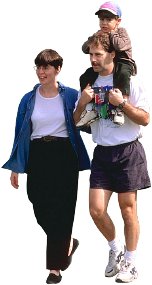Home Page
The latest articles, features and news.


All About...


Sponsored Links


Discussion Forums




Pecker Provisions


Condoms, lubes, pumps, stretchers, exercises, supplements, sports underwear and more.

Firefly Talks Dicks


Words of feminine wisdom about men's problems.

|
| | |
|

18 May 2001
Exercise & Weight Key Factors In Impotence
by George Atkinson  Researchers from Boston University School of Medicine and the New England Research Institutes report that physical activity at a level of at least 200 calories a day - the equivalent of walking briskly for two miles - may reduce a man's risk of developing erectile dysfunction (ED)(impotence). The study, which appears in the August issue of Urology, is the first of its kind to show that men who exercise, even those who begin exercising at mid-life, are at a lower risk for developing ED as compared to sedentary men.
Researchers from Boston University School of Medicine and the New England Research Institutes report that physical activity at a level of at least 200 calories a day - the equivalent of walking briskly for two miles - may reduce a man's risk of developing erectile dysfunction (ED)(impotence). The study, which appears in the August issue of Urology, is the first of its kind to show that men who exercise, even those who begin exercising at mid-life, are at a lower risk for developing ED as compared to sedentary men. The researchers analyzed data from nearly 600 men who had reported no problems with ED. They focused on risk factors such as smoking, alcohol consumption, and obesity and exercise habits. Eight years later, the researchers looked to see if the same 600 men had made any changes in these behaviors and if these changes effected their risk for ED. They concluded that smoking cessation in middle age did not significantly reduce ED risk. "There was no significant difference in risk between men who quit smoking and those who continued to smoke," said author Irwin Goldstein, MD, professor of urology at Boston University School of Medicine. The same held true for men who stopped drinking. In addition, men who were over-weight were at increased rate of developing ED regardless of whether they lost weight or not. However, men who remained active or even began physical activity at midlife were at the lowest risk of developing ED. Further, a dose-response relationship was identified between the probability of ED and the level of physical activity. "Men who exercised more than the 200 calories a day, had the lowest risk of developing ED," added Goldstein. "This is the first longitudinal population-based study to show that exercise, which is beneficial for many other cardiovascular conditions, benefits sexual function as well. The implications of this are enormous," added Goldstein.
|
|